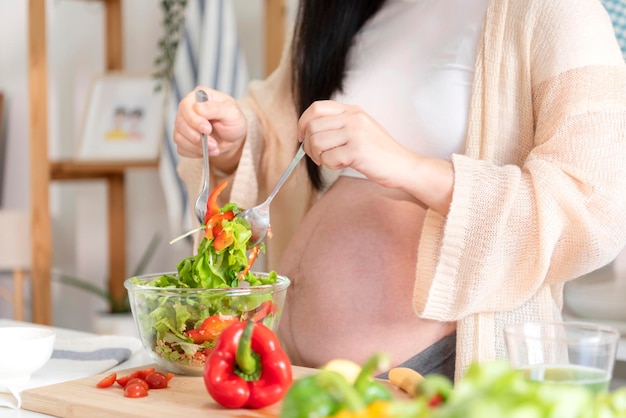
### Why Is Healthy Eating Important During Pregnancy?
Eating well during pregnancy plays a crucial role in ensuring both the mom and baby stay healthy. It gives the baby the nutrients needed to grow, build strong and functioning organs, and develop properly throughout the full-term pregnancy (about 38 weeks). At the same time, it helps the mom maintain her own health during this demanding time. While some people refer to pregnancy as “eating for two,” it’s not about eating more, but rather eating the *right* kinds of food.
When unhealthy or nutrient-poor foods dominate the diet during pregnancy, it deprives both the mother and baby of vital nutrients. Over time, this can have serious consequences for both. A pregnant body needs extra iron, calcium, protein, and essential vitamins to support the baby’s organ development, healthy bones, and blood supply. If the mother doesn’t consume enough of these, her body will pull nutrients from its own reserves. For example, if there isn’t enough calcium in her diet, her body will take it from her bones to provide for her baby, which harms both her and the pregnancy. Similarly, since babies can’t produce their own iron in the womb, they rely entirely on their mother’s intake. Low levels of iron can result in severe anemia for the mom. This is why prenatal vitamins are often recommended—they help fill in these nutritional gaps.
Eating poorly during pregnancy not only keeps necessary nutrients off the table but also takes up space in your diet that should be filled with nourishing food. So, it’s crucial to focus on eating healthy and making sure every meal counts!
### What Foods Should Be Avoided During Pregnancy?
Some foods not only lack nutritional value but could actually harm a developing baby due to certain toxins, bacteria, or chemicals. Knowing which foods to avoid is essential for having a safe and healthy pregnancy.
– **Peanuts**: Eating peanuts during pregnancy may increase the baby’s risk of developing a peanut allergy. Traces of peanut proteins can reach the fetus, leading to sensitization, which might later trigger an allergic reaction after birth.
– **Certain Seafood**: Fish like shark, swordfish, mackerel, and canned tuna are high in mercury, which can damage a baby’s developing nervous system. While the FDA suggests a small amount of tuna (about 6 ounces per week) may be safe, it’s a topic of ongoing debate. Safer seafood options include salmon, catfish, and trout.
– **Undercooked or Unpasteurized Foods**: Foods like raw or undercooked meat, certain cheeses (such as goat cheese or Mexican cheeses), and fresh juices that haven’t been pasteurized can expose moms to harmful bacteria like Listeria, which may cause food poisoning. While food poisoning doesn’t directly affect the baby, it can lead to dehydration from vomiting or diarrhea. Always fully cook meat and opt for pasteurized dairy products.
– **Alcohol**: Alcohol is never considered safe during pregnancy, especially in the early stages. It can cause defects in facial development, intellectual disabilities, and even a condition called Fetal Alcohol Syndrome. Alcohol also increases the risk of miscarriage and stillbirth.
– **Caffeine**: While caffeine feels like a mild pick-me-up for adults, it can have a stronger effect on a developing baby, potentially impacting their heart rate. Doctors recommend limiting caffeine to less than 200 mg a day (around one small cup of coffee), though avoiding it entirely is safest. High caffeine intake has been linked to pregnancy loss in some cases.
– **Herbal Teas**: Many people switch to herbal tea thinking it’s a safe alternative, but certain herbs may have harmful effects on pregnancy. Since there is little research on the safety of herbs during pregnancy, it’s often best to avoid herbal teas unless specifically cleared by a doctor.
– **Processed Meats and Hot Dogs**: These foods can harbor Listeria bacteria, which is dangerous for both mother and baby. If you must eat hot dogs, make sure they’re cooked to at least 160°F. Cold lunch meats should generally be avoided.
– **Unwashed Produce and Sprouts**: Fruits, vegetables, and sprouts that haven’t been washed can carry harmful bacteria like E. coli, salmonella, or Listeria. Don’t skip fresh produce—it’s packed with nutrients—but always wash it thoroughly with soap and water before eating.
### Safe Foods to Focus On During Pregnancy
The good news is that there are plenty of healthy and delicious foods you can enjoy during your pregnancy as long as they’re fresh, unprocessed, and prepared correctly. Prioritize options like:
– **Green Leafy Vegetables**: Always wash these well to remove bacteria.
– **Brightly Colored Fruits and Vegetables**: Think red, yellow, orange, and purple varieties—rich in vitamins.
– **Lean Meats and Freshwater Fish**: Ensure they’re fully cooked to avoid bacteria.
– **Whole Grains**: Look for whole-grain breads, cereals, and enriched grains.
– **Low-Fat Dairy Products**: Opt for pasteurized options like milk, cheese, yogurt, and eggs.
– **Healthy Fats**: Include avocados, almonds, Brazil nuts, and olive oil.
– **Limit Processed Carbs and Sugars**: Use these sparingly to avoid empty calories.
### Final Thoughts
Pregnancy is a time to really focus on nourishing both your body and your growing baby. What you eat sets the foundation for your baby’s health now and in the future. By making smart food choices and avoiding harmful foods, you’ll give your baby the best possible start in life. Remember, every bite matters!